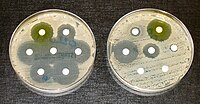
Photo from wikipedia
Nosocomial meningitis caused by Gram-negative bacteria is associated with increasingly common neurosurgical procedures in children, with an increase in incidence recently reported. These infections are associated with an increased risk… Click to show full abstract
Nosocomial meningitis caused by Gram-negative bacteria is associated with increasingly common neurosurgical procedures in children, with an increase in incidence recently reported. These infections are associated with an increased risk of mortality, prolonged hospitalisation, and increased costs. In this report, we describe two paediatric cases with central nervous system infections caused by extensively drug-resistant Gram-negative bacteria that were successfully treated with intraventricular colistin. To the best of our knowledge, this is the first comprehensive review and discussion of intraventricular antimicrobial therapy in a paediatric population. Based on our comprehensive review of the relevant literature, it appears that intraventricular administration of colistin may be a promising and effective option in the treatment of central nervous system infections in children who do not respond to other treatment options.
Journal Title: Journal of Chemotherapy
Year Published: 2021
Link to full text (if available)
Share on Social Media: Sign Up to like & get
recommendations!